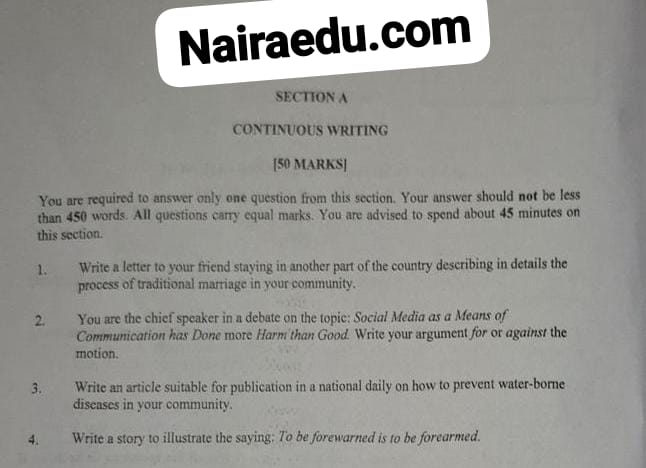Welcome to Nairaedu.com where we provided you answer to the question: Write a story to illustrate the saying: To be forewarned is to be forearmed.
Write a story to illustrate the saying: To be forewarned is to be forearmed
It was the middle of the rainy season in the quiet village of Umuoka. The clouds were darker than usual, and the rains fell in long, heavy torrents that turned the earth into mud and the roads into rivers. But it wasn’t the rain that troubled the villagers; it was the stories that followed it.
Old Mama Ifeoma, the oldest woman in Umuoka, had gathered the young children around the village square one evening and warned them about the swollen river that ran just beyond the farmlands. “The river is angry this year,” she said, her voice deep and serious. “It will claim anyone who dares to cross it carelessly.”
The children listened with wide eyes, and most went home afraid but thankful. Everyone knew Mama Ifeoma’s warnings often came true. She had lived through two floods and once predicted a snake infestation that almost ruined the yam harvest. But not everyone paid attention.
Chuka, a bold and curious fifteen-year-old, laughed off Mama Ifeoma’s warnings. “She’s just trying to scare us,” he told his friends. “That river has always been high during the rains. What’s new?”
Chuka was determined to prove her wrong. One afternoon, he decided to take a shortcut to his uncle’s house, which meant crossing the very river Mama Ifeoma had warned them about. He reached the riverbank and saw the current rushing faster than he had ever seen. Still, his pride pushed him forward.
He stepped into the water slowly, gripping a long stick to feel his way. At first, the water was knee-deep. Then waist-deep. Then it suddenly surged. In an instant, the stick slipped from his hand, and the current dragged him away. He screamed for help, but no one was around.
Luckily, Emeka, a hunter who had heeded Mama Ifeoma’s warning and set traps farther from the river, heard Chuka’s cries. He rushed over, threw him a rope, and managed to pull him to safety.
When they returned to the village, soaked and shaken, Chuka’s pride was gone. He went straight to Mama Ifeoma’s hut and knelt before her. “I should have listened,” he said. “You were right.”
Mama Ifeoma only nodded. “Warnings are not curses, my son. They are blessings in disguise. You were lucky this time.”
From that day on, Chuka became the loudest voice echoing her warnings. He told the story of how he almost drowned to anyone who would listen, especially children. And every time he did, he ended with the same words Mama Ifeoma had spoken to him. “To be forewarned is to be forearmed.”
YOU CAN ALSO USE THIS VERSION
To be forewarned is to be forearmed
The Warning That Saved Us
It was a bright Monday morning in the peaceful village of Agbaja. As usual, the villagers were busy going about their daily activities. Children were in school, farmers had gone to the fields, and traders were in the market. Life was simple and sweet, and nobody expected that danger could be lurking nearby.
One afternoon, during the school break period, I was playing under the mango tree with my friend Daniel when we noticed a stranger walking briskly towards the headmaster’s office. He looked worried and dusty, like someone who had travelled a long distance. We later discovered that the man was from a neighbouring village called Umuleri. He had come with an urgent message — one that would change the course of events in Agbaja.
The stranger warned the headmaster that a group of armed robbers had been attacking nearby villages. According to him, the robbers moved from one community to another at night, breaking into homes and stealing valuable items. They were dangerous and well-armed. Umuleri had just been attacked the previous night, and he was certain Agbaja could be next.
Immediately, the headmaster alerted the village chief and the town crier. That same evening, a meeting was held at the village square. Every household was advised to be on high alert. Young men formed vigilante groups and took turns guarding the village at night. The police in the nearby town were informed, and a patrol team was sent to support the local efforts.
Three nights later, the robbers struck.
Around midnight, the village watchmen noticed strange movements along the bush path. Without wasting time, they raised the alarm. The police patrol team, along with the vigilante group, quickly surrounded the area. A fierce exchange followed, but because we were prepared, the robbers were overpowered. Two were arrested, and the rest fled into the night.
The whole village rejoiced. We were grateful that no lives were lost, and no property was stolen. Everyone agreed that if not for the timely warning from the stranger, Agbaja would have been caught unprepared and the consequences could have been disastrous.
Since that day, I have never forgotten the lesson. Warnings, no matter how small, should not be ignored. Truly, as the saying goes, to be forewarned is to be forearmed.
Also Read: Write A Letter To Another Friend Of Yours Explaining In Detail What Happened

Mr. Femi is an education blogger who simplifies exam updates and study tips for Nigerian students. His goal is to make learning smart, easy, and rewarding.


1 thought on “Write a story to illustrate the saying: To be forewarned is to be forearmed”